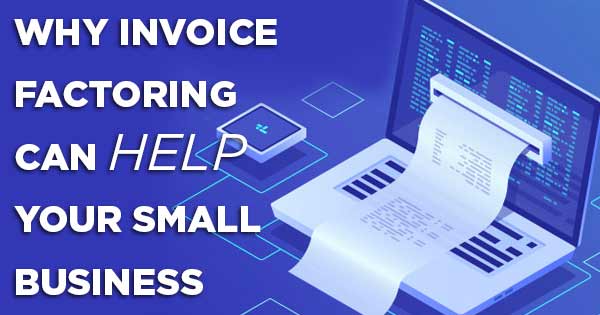
Are you a small business owner struggling with cash flow issues? You’re not alone. In fact, cash flow challenges are one of the primary reasons many small businesses fail. Growing businesses often face the frustrating reality that profits are not being realized fast enough, causing a major gap between issuing invoices and receiving payments. In turn, this puts immense pressure on your business’s ability to cover operational expenses, pay staff and suppliers, or invest in growth opportunities. But what if there was a solution to help you resolve these cash flow dilemmas? Enter Invoice Factoring – a financial instrument that has been helping businesses like yours overcome cash flow obstacles and stay on the path to success. In this article, we will explore how invoice factoring can be your lifesaver and support the growth and sustainability of your small business. So, buckle up and let’s delve into the world of invoice factoring and discover how it can be the lifeline your business needs to thrive in today’s competitive landscape.

1. The Benefits of Factoring for Small Businesses
Invoice factoring is becoming an increasingly popular financial solution for small businesses looking to overcome cash flow challenges. There are several advantages of adopting factoring for your business, including:
– Improved liquidity: Factoring allows businesses to receive immediate funds, turning outstanding invoices into cash, thus enhancing the company’s cash flow.
– Outsourcing accounts receivable: Factoring companies assume responsibility for collecting customer payments, enabling a business to focus on more crucial tasks.
– Accessible financing: Invoice factoring allows businesses to secure funding without resorting to traditional bank loans, which can be particularly helpful for companies with damaged credit.
– Mitigating financial risks: Non-recourse invoice factoring protects businesses from bearing the losses associated with unpaid invoices.
– Extended payment terms: Factoring enables companies to offer their customers longer payment terms without compromising on cash flow, facilitating business growth and expansion. [1][2]
2. Why Cash Flow Is Crucial to Your Business
Cash flow is the lifeblood of any business, regardless of its size or industry. A healthy cash flow allows for the smooth operation of a company and ensures its growth and development in the long run. Here are some reasons why cash flow is crucial to your business:
– Continuous operations: Adequate cash flow enables businesses to meet their daily expenses, such as purchasing inventory, paying wages, and covering overhead costs.
– Expansion and growth: Businesses with a stable cash flow can invest in new opportunities and projects, contributing to overall growth.
– Financial stability: Maintaining a positive cash flow allows companies to settle debts and avoid bankruptcy, ensuring long-term stability in the industry.
– “Cash is king”: As the saying goes, cash is king in the business world. The ability to generate cash consistently through daily operations can determine the success or failure of a business.
Managing cash flow effectively plays a significant role in the longevity and prosperity of small businesses. This is why cash flow is crucial to your business’s success. [3][4]
3. How Invoice Factoring Works
Invoice factoring is an effective financial solution for small businesses looking to improve their cash flow. Here’s a quick overview of how it works:
– A business sells its unpaid invoices to a factoring company in exchange for immediate funds, usually ranging between 75% and 90% of the invoice value.
– The factoring company takes responsibility for collecting payments from the business’s customers and remits the remaining invoice amount to the business, minus a small fee.
– Invoice factoring helps businesses receive funds faster, allowing them to manage cash flow needs, pay debts, and invest in growth opportunities.
In a nutshell, invoice factoring streamlines the accounts receivable process and enhances financial stability for small businesses. With this financial tool in place, businesses can focus on their core operations and unlock new growth opportunities. [5][6]
4. Overcoming Cash Flow Challenges with Factoring
Overcoming cash flow challenges is crucial for the success of small businesses. Invoice factoring is a powerful tool that can help businesses navigate through financial obstacles and maintain steady cash flow by converting invoices into immediate cash. Here’s how factoring can help businesses overcome cash flow challenges:
– Accelerating funding: Factoring significantly reduces the waiting time for invoice payments, allowing businesses to maintain their financial stability.
– Consistent cash flow: By converting accounts receivable to cash quickly, factoring ensures a constant stream of funds, helping businesses meet their operational expenses and financial obligations.
– Flexibility: Factoring allows businesses to take on more opportunities and jobs without being constrained by limited cash flow.
With factoring, small businesses can focus on their core operations and grow without worrying about cash flow challenges. [7][8]
5. Getting Cash Quickly with Factoring
Invoice factoring has proven to be a valuable solution for small businesses facing cash flow challenges. Businesses benefit greatly from factoring, as it provides the following advantages:
– Faster access to cash: Selling invoices to a factoring company can help small businesses receive up to 75-90% of the invoice amount immediately, significantly improving liquidity.
– Reduced financial strain: Factoring enables businesses to focus on their core operations without worrying about pending invoice payments.
– Alternative to traditional loans: Unlike loans, factoring does not involve high interest rates or binding repayment terms.
– Enhanced growth potential: Quick access to cash allows businesses to invest in new ventures and take advantage of emerging opportunities.
– Flexibility: Factoring offers flexible financing options tailored to a business’s unique needs, making it a reliable, short-term solution for cash flow management. [9][10]

6. Avoiding Late Payments from Customers
One significant challenge that small businesses face is dealing with late payments from customers. This can hinder a company’s growth, impede cash flow, and restrict its ability to manage day-to-day operational costs. To avoid late payments and ensure a steady cash flow, businesses can adopt the following strategies:
* Offer incentives: Encourage customers to pay early by providing discounts, as Dave Kip from Best Broadcast did initially.
* Set clear payment terms: Establish concise payment terms and communicate them effectively, thereby managing customer expectations from the outset.
* Utilize invoice factoring: As seen in the case of Ray Bowman’s environmentally conscious tree services company, invoice factoring can help businesses release trapped cash in accounts receivables, freeing up cash flow to support growth.
By implementing these strategies, small businesses can stay ahead of cash flow challenges and maintain a steady pace of growth. [11][12]
7. Factoring vs. Traditional Bank Financing
Factoring and traditional bank financing are two different methods for small businesses to access the funds needed to overcome cash flow challenges. Let’s compare these financing options to help you better understand their distinctive features:
– Factoring: This option involves selling your accounts receivable to a factoring company, allowing you to generate cash immediately instead of waiting for your customers to pay. Factoring provides more liquidity and is a good choice for businesses with inconsistent cash flows or those that don’t qualify for traditional bank loans.
– Traditional Bank Financing: This financing method usually requires businesses to have an established credit history and agree to repay the loan amount over a specified period. While bank loans may offer lower interest rates, they often have stricter qualification criteria and longer approval times compared to factoring.
As a small business owner, choosing the right financing option for your company depends on your specific needs, creditworthiness, and desired level of flexibility. [13][14]
8. Finding the Right Factoring Partner
Finding the right factoring partner is crucial in ensuring the success and growth of your small business. It’s essential to select a company that not only understands your business needs but also offers flexible, convenient and rapid invoice financing services. Keep the following points in mind when searching for the perfect factoring partner:
– Look for a company with expertise in your industry, as they will better understand your specific challenges.
– Consider the factoring fees and choose a partner with transparent and competitive pricing.
– Ensure that the factoring partner offers quick cash advances, ideally within a few business days.
– Check their integration with popular accounting software like QuickBooks and OpenInvoice, which makes it easier to manage your finances.
Remember, partnering with the right factoring company can help your small business overcome cash flow challenges and set the stage for future growth. [15][16]
9. Success Stories: How Businesses Have Thrived with Factoring
Invoice factoring has proven to be a game-changer for many businesses, helping them thrive even in challenging situations. Here are a few success stories:
– Ray Bowman, Owner and President of an environmentally conscious tree service company, overcame cash flow constraints with invoice factoring. The extra working capital enabled him to double sales and maintain positive relationships with subcontractors.
– Best Broadcast, an audiovisual company, resolved cash flow crunches through invoice factoring. This allowed CEO Dave Kip to focus on business strategy and enjoy a stress-free operation.
– A custom manufacturer of premium store display fixtures leveraged invoice factoring to access regular cash flow, overcome growth challenges, and fulfill large orders.
These examples illustrate that gaining better control over cash flow can empower businesses to seize growth opportunities and reap rewards. Invoice factoring enables companies to achieve their full potential, even amidst financial challenges. [17][18]

10. Taking Your Business to the Next Level with Factoring
In order to take your business to the next level, implementing invoice factoring can be an effective solution to overcome cash flow challenges. Here are some key points to consider:
– Accelerate funding: Invoice factoring enables you to receive quick payment in cash, usually within 24 hours of an established relationship with a factor, providing immediate liquidity.
– No debt incurred: Factoring is a sale of assets (invoices), not a loan, making it an attractive alternative for businesses that wish to avoid incurring more debt.
– Streamlined collections: Most factoring is non-recourse, meaning the factor company assumes responsibility for debt collection, saving you time and effort.
In summary, factoring can help your business grow by alleviating cash flow constraints, allowing you to focus on seizing new opportunities and expanding your operations. [19][20]


